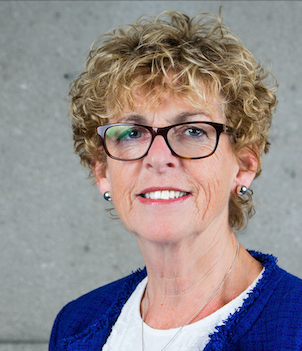One of the outcomes of a Strategic Planning Meeting, held in January 2019, was the decision to identify ‘working groups’ with board members encouraged to join a working group or to appoint people from their region to a working group . Four groups were proposed:
- Stakeholder Engagement
- Sustainability
- Capacity Building
- Communication
It was suggested that Youth Engagement be a fifth priority to be introduced in the future.
The Chairs of each working group form a Leadership Team and its membership also includes the members of the IBE Management Committee and the Executive Director.
The team meet regularly, either face to face or by video call, and are tasked with providing accountability for the implementation of the IBE Strategic Plan.
Leadership Team Members

Chair: Communications Working Group
Mary Secco
Canada

Chair: Stakeholder Engagement Working Group
Francesca Sofia
Italy

Chair: Sustainability Working Group
Philip Gattone
USA

Chair: Capacity Building Working Group
Graeme Shears
Australia

IBE President
Martin Brodie
Scotland

IBE Treasurer
Anthony Zimba
Zimbabwe

IBE Executive Director
Ann Little
Ireland
Stakeholder Engagement Working Group: Chaired by Francesca Sofia
It was proposed:
- That by 2023, a minimum of 50% of the board should be stakeholders (persons with epilepsy, care providers, staff of not-for-profit epilepsy organisations).
- IBE should look to develop advocacy training. This needed three separate approaches for chapters in high-, middle-, and low-income countries and tailored as needed.
- Define ‘who’ are our stakeholders?
- People living with epilepsy need to have access to becoming a board member.
- An element of the engagement programme could be to develop a summer school to train stakeholders on how to be more engaged.
- That a list of possible outstanding “champions” would be drafted; people in the list would be contacted and asked to join the group. The Group will continue to monitor the stakeholder landscape over time, to find and involve more “champions”
It was agreed that the Stakeholder Engagement Working Group would be responsible for leading the implementation of the following strategic priorities:
- Advocate with WHO, UN to recognize epilepsy as a worldwide need and to aggressively pursue strategic global outreach – develop a global action plan for IBE advocacy and WHO in collaboration with partner organisations like ILAE.
- Encourage member countries to implement legislative and regulatory changes within each country to promote human and civil rights for people living with epilepsy, and report on progress to IBE.
- Encourage all chapters to include people impacted by epilepsy on their boards, in their planning and in their activities.
- Ensure that all international, regional and national meetings in which IBE is involved, include tracks for lay organisations, social services, and for people and families affected by epilepsy.
- Encourage youth councils in member organisations.
- Assist with the development of new chapters in areas that are not currently served.
Sustainability Working Group: Chaired by Phil Gattone
The terms of reference for the group will include the following:
- Recommendation of whether to hire a resource development manager.
- Build a comprehensive case for financial support.
- Identify attractive projects for funding included Promising Strategies, EpilepsyNext, International Epilepsy Day, IBE website, etc.
- Identify donors and a process for solicitation.
- Encourage chapters to identify large donors, 10% of any donation raised in a region could be provided to the chapter.
- Idea to develop a ‘Friends of IBE’ group.
The Sustainability Working Group will be responsible for leading the implementation of the following strategic priorities:
- Seek support to allow lay organisations and people with epilepsy to attend International Epilepsy Congresses or Regional Epilepsy Congresses.
- Evaluate dues and means of financial support for IBE and make recommendations for changes to improve IBE’s financial status, sustainability and independence.
- Create representative inter-regional and cross-regional task forces for each IBE goal to foster inter-organisational mentoring, best practice exchange, and to support the development of action plans and recommendations on standards and strategies for action for regions, for countries, and for IBE.
Capacity Building Working Group: Chaired by Graeme Shears
The terms of reference for the group will look at the following:
- What capabilities is IBE missing?
- Who are the members of the IBE?
- What are the staffing needs?
- How do we recruit volunteers and provide mentoring?
- How can we involve people with epilepsy at all levels up to board membership. Board members should have skills and reason to commit.
- Is IBE ‘for’ people with epilepsy or ‘of’ people with epilepsy?
It was agreed that the Capacity Building Working Group would be responsible for leading the implementation of the following strategic priorities:
- Encourage each chapter to support making epilepsy a health priority within their respective country, and encourage mentoring within regions to promote epilepsy as a public health priority.
- Encourage and incentive each IBE member country to report on progress on strategic global outreach targets to IBE and regularly share information with WHO and others on progress.
- Create and share model legislation and guidelines with IBE chapters, and offer mentoring to member countries form those who have successfully made impact.
- Encourage regions to identify epilepsy-focussed human and civil rights goals for their member organizations.
- Ensure that all international, regional and national meetings in which IBE is involved, include tracks for lay organisations, social services, and for people and families affected by epilepsy.
- Create representative inter-regional and cross-regional task forces for each IBE goal to foster inter-organisational mentoring, best practice exchange, and to support the development of action plans and recommendations on standards and strategies for action for regions, for countries, and for IBE.
- Establish a mentoring program where chapters offer to provide information exchange.
Communications Working Group: Chaired by Mary Secco
The terms of reference for the group will include the following:
- Develop a communications strategy .
- Identify people with communications skills – e.g. pro bono support from ad agencies, PR companies for social media campaigns, stakeholders who are professional communicators, etc.
- The WHO Epilepsy Report will be a valuable document for communications.
- A clear professionally developed message was needed.
- A style guide should be developed (use of terms: epileptic, patient, lay organisation, etc.).
- Consideration of a Stigma Task Force
- ‘Understanding Epilepsy in the World’ research group
It was agreed that the Communication Working Group would be responsible for leading the implementation of the following strategic priorities:
- Advocate with WHO, UN to recognize epilepsy as a worldwide need and to aggressively pursue strategic global outreach. Develop a global action plan for IBE advocacy and WHO in collaboration with partner organisations like ILAE.
- Encourage and incentivise each IBE member country to report on progress on strategic global outreach targets to IBE and regularly to share information with WHO and others on progress.
- Share and promote accurate, up-to-date information on the impact of epilepsy in different regions; its treatment and its consequences; through websites, newsletters, conferences.
- Provide accurate information exchange on evidenced-based best practices in self-management of epilepsy, epilepsy in schools, youth and young adult programmes, and other identified programs through face to face meetings, digital platform (website), newsletter, and other identified means.
- Promote the use of electronic and social media to inform and exchange information, as well as to create communities among people affected by epilepsy.
- Ask member countries and community partners to link to the IBE website and track growth in participation.
- Encourage chapters to pursue awareness and education campaigns about current concerns of epilepsy, prevention, need for better treatment for those affected.
- Utilize electronic platforms for meetings within regions and cross regionally to promote information exchange and to support the creation of collaborative learning groups.


